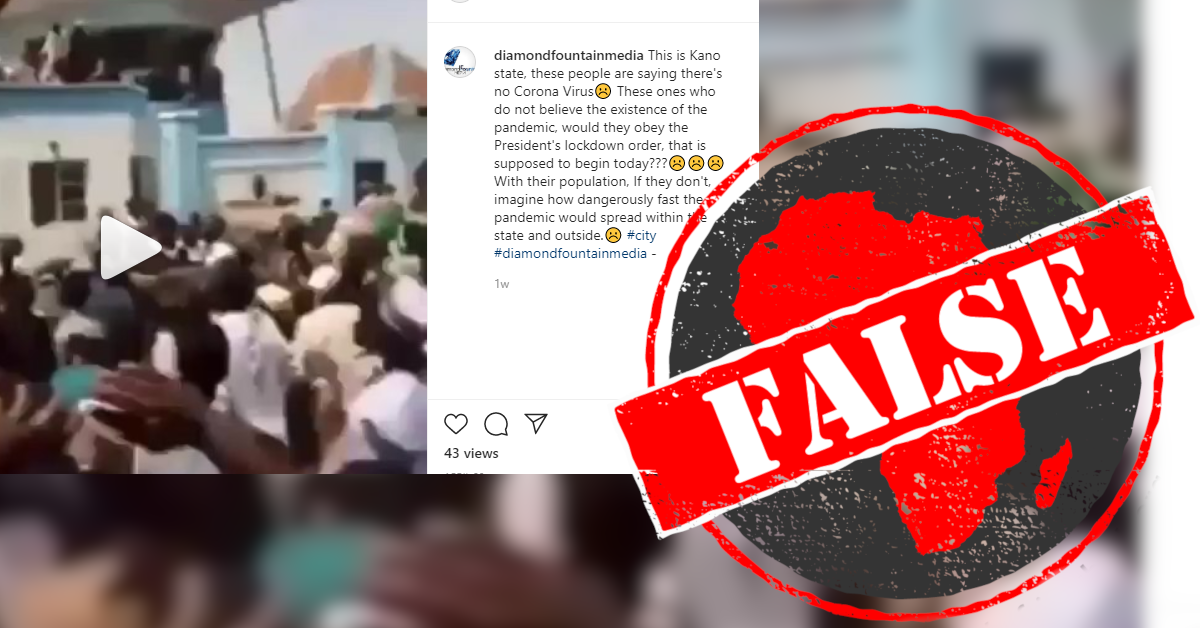A video is making the rounds online with the claim it shows people in Nigeria’s Kano state protesting against a government-imposed lockdown to curb the Covid-19 outbreak.
It’s been shared on Instagram, WhatsApp and Facebook with the caption: “Kano rejects lockdown and curfew. It's a problem of the rich. I have wives and children to feed. God will save us.”
The video shows people in the street, mainly women, chanting “bamayi”, a Hausa word for “we are not doing”.
The people of Kano, the most populous state in northern Nigeria, are mainly Muslim members of the Hausa and Fulani communities.
On 3 May 2020 a presidential task force on Covid-19 linked an unusual increase in deaths in the state to the disease.
By 11 May 26 people in Kano were confirmed to have died from Covid-19, the second-highest toll after Lagos state, which recorded 33 deaths.

There are a number of clues that the protest did not take place in Kano.
First, the conservative Muslim culture of the state would make it almost impossible for women to take part in a protest there.
A man in the video can be heard saying, in Hausa: “This is wickedness. We have families and they asked us to stay at home for weeks without food or any help.”
Another person adds: “This is what is happening in Plateau state today. This is true, the poor are tired.”
Other voices in the video also suggest that the protest was in Plateau state, which does not share a border with Kano.
The Nigerian Tribune newspaper reported the incident as having happened in Jos, the capital city of Plateau state, on 25 April.
The paper said the women “were protesting for inability to get palliatives as promised by the government”. By “palliatives” it meant food.
Plateau imposed a lockdown from 9 to 15 April. The state reported its first case of Covid-19 on 23 April. – Fatima Abubakar
It’s been shared on Instagram, WhatsApp and Facebook with the caption: “Kano rejects lockdown and curfew. It's a problem of the rich. I have wives and children to feed. God will save us.”
The video shows people in the street, mainly women, chanting “bamayi”, a Hausa word for “we are not doing”.
The people of Kano, the most populous state in northern Nigeria, are mainly Muslim members of the Hausa and Fulani communities.
On 3 May 2020 a presidential task force on Covid-19 linked an unusual increase in deaths in the state to the disease.
By 11 May 26 people in Kano were confirmed to have died from Covid-19, the second-highest toll after Lagos state, which recorded 33 deaths.

Protest for food, in Plateau state
There are a number of clues that the protest did not take place in Kano.
First, the conservative Muslim culture of the state would make it almost impossible for women to take part in a protest there.
A man in the video can be heard saying, in Hausa: “This is wickedness. We have families and they asked us to stay at home for weeks without food or any help.”
Another person adds: “This is what is happening in Plateau state today. This is true, the poor are tired.”
Other voices in the video also suggest that the protest was in Plateau state, which does not share a border with Kano.
The Nigerian Tribune newspaper reported the incident as having happened in Jos, the capital city of Plateau state, on 25 April.
The paper said the women “were protesting for inability to get palliatives as promised by the government”. By “palliatives” it meant food.
Plateau imposed a lockdown from 9 to 15 April. The state reported its first case of Covid-19 on 23 April. – Fatima Abubakar
Republish our content for free
For publishers: what to do if your post is rated false
A fact-checker has rated your Facebook or Instagram post as “false”, “altered”, “partly false” or “missing context”. This could have serious consequences. What do you do?
Click on our guide for the steps you should follow.
Publishers guideAfrica Check teams up with Facebook
Africa Check is a partner in Meta's third-party fact-checking programme to help stop the spread of false information on social media.
The content we rate as “false” will be downgraded on Facebook and Instagram. This means fewer people will see it.
You can also help identify false information on Facebook. This guide explains how.





Add new comment